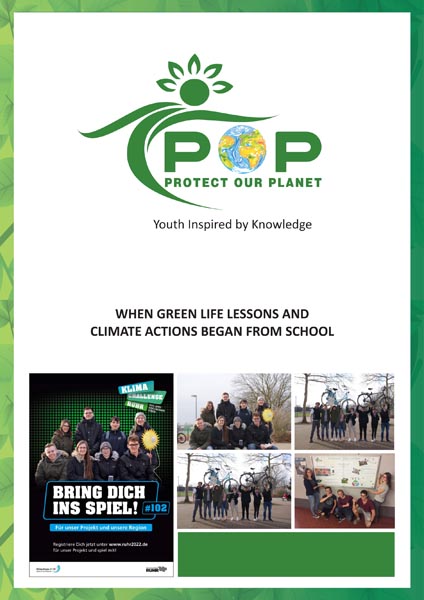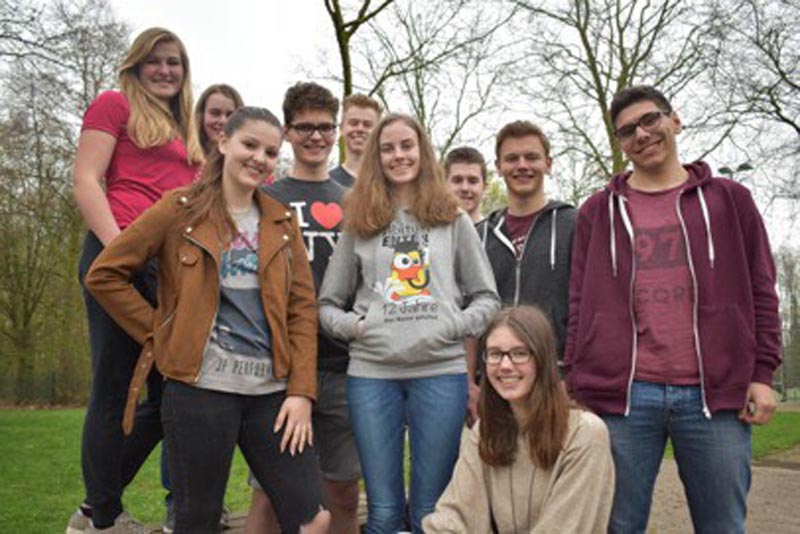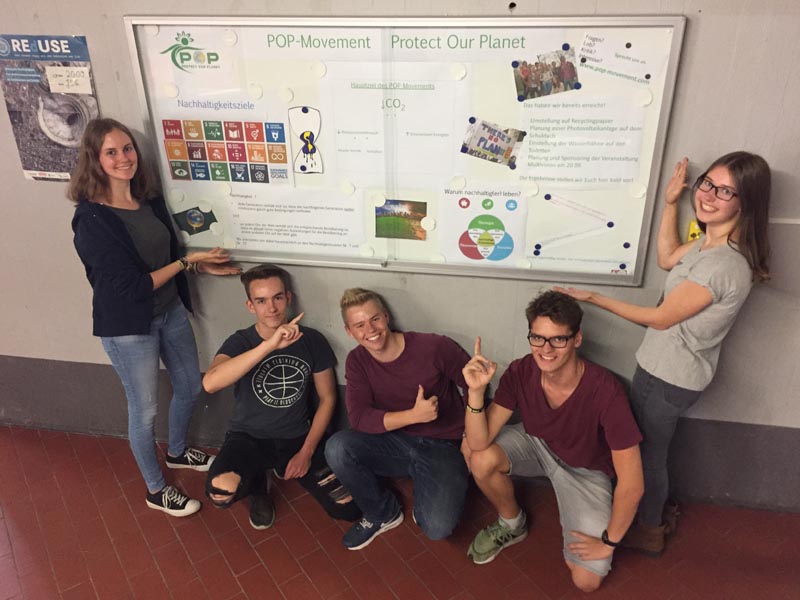In a highly competitive world where popular professions are considered an endgame that determines one’s success in all spheres of life, schools and educational institutions exercise their curriculum in such a way that subjects are taught to inspire students to decide on their future careers. While this arrangement is a great way of enabling students to form informed opinions about their future prospects, this process often neglects the sphere of social responsibility. In recent decades, with several institutions coming out of this one-dimensional learning process, schools have begun reorganizing their educational priorities.
Initial thrust and guiding philosophy
This is the story of a school in Germany known as “Julius-Stursberg-Gymnasium”, whose POP group sets an unconventional paradigm in evoking environmental consciousness amongst its students. Its unconventionality stems from the fact that its functioning differs from those of other clubs in the school in many ways, including the time of work which is indeterminate. Consisting of members aged between 14 and 18 with various skills and interests, the team is spearheaded by Andreas Forsthövel, a teacher of Geography in the school. Unlike the mainstream sustainability groups found in many schools that often focus on awareness campaigns alone, POP – Germany stands out for collaborating with the school management and city council in the implementation of contemporary ideas and sustainable solutions on campus.
Founded in 2017 after meeting with Dr. R.K. Pachauri at a world expo on renewable energy in Kazakhstan, the inception and growth of POP – Germany has been primarily orchestrated by Andreas Forsthövel. His consistent effort with the students has led the team to achieve several environmental milestones. In 2017, with their first initiative being the calculation of carbon footprint in the campus, the POP team made an investigation on the means of transport used by students to commute to and from school and the distances covered. The calculated percentage was used to sensitize the student community about their projected carbon emissions and to encourage students to carpool or use bikes to cover short distances.
Local initiatives and impacts
Next on their agenda was addressing the issue of usage of around 800,000 copies of paper each year as there was a big call for recycled paper in school. POP – Germany facilitated the transition from fresh fiber papers to recycled papers which lowered the Co2 emissions by 2.6 tons. Just by using recycled paper the school saves around 12 tons of wood and 213,000 liters of water every year. Their success in preventing the emissions of Co2 by 100% and saving 50% of wood and 80% of water by the adaptation of recycled paper is an inspiration for institutions around the world to adopt this course of action.
The POP team never runs out of local problems to tackle or innovations to implement. Their efforts towards reducing massive water wastage in restrooms is a story worth recounting. With renovations in school infrastructure going on for about 2 to 3 years, the school has automatic water faucets now. When it was found that the faucets were running for a long time even after the students washed their hands, the team decided to conduct a two-week study. They counted the number of people who used the faucets and the number of times a faucet was used in a day. Through some tests and experiments, they observed that, on an average, a person needed about 12 seconds of running water to wash their hands, whereas some faucets were running for more than a minute. With the data collected and the calculations made, the team took the issue to the city council and obtained permission to reduce the water limit to 12 seconds. By this initiative, the team saves around 115,000 liters of water in school every year.
In addition to their action-oriented projects, the team also focusses on student advocacy. With the support of the state of Germany, the team has booked shows on consumer behavior for all the students on campus. Additionally, the data collected from their past research is disseminated through sensitization campaigns.
Taking on the climate challenge
The school is currently participating in a competition called, “Climate Challenge Ruhr” organized by the cities who are part of the Ruhr area to promote green-metropolises. Being the largest industrial area in Europe, the Ruhr used to be a big hub for chemical industries and coal mines. All the cities in the Ruhr area have come together to promote green and sustainable growth in the region. “Climate Challenge Ruhr” has a participation of around 53 teams competing for four weeks. Each team has numerous players contributing points through sustainable action in their everyday lives. For example, a person taking public transport instead of a car, can take a picture of the activity and upload it to support a particular team. With points collected in this manner, the team that gets most points at the end of four weeks wins a particular amount of money.
Andreas admits to be a great fan of this competition, since in most cases, whenever he receives applications for school competitions on climate change, it is some kind of green washing and nothing more. “Climate Challenge Ruhr” is interesting in the way it is being executed. Prior to the competition, the teams make a claim of how the money will be used. Since there is no sitting arrangement for the students in the school yard due to construction work, POP – Germany has wished for a solar bench for the students to sit on, which is additionally made out of PV (Photovoltaic) solar models that creates enough energy to charge electronic devices like mobile phones. While the generation of energy won’t be considerably large, the fundamental idea behind this bench is that the students are exposed to a product like this on a daily basis and are stimulated to think about modern ways of producing energy. This would promote lifestyle changes and alterations in behavior. A lot of students from this school are engaging in sustainable efforts to contribute to the competition with the end product in mind.
The renovation work in the school has prompted other sustainability projects as well. In association with a local energy company, POP – Germany has pursued the project of installing solar panels on the renovated roofs, in conversations with the city council. With consistent efforts and patience, the project has now been finalized with the installation of PV sensors due to take place once the renovation is complete.
Innovative models to evolve ideas
The POP team ensures targeting young students as well. In an attempt to enlighten them on the carbon impact of every individual, the team built a weight model wherein students from classes 5 and 6 were asked to install weight on one side based on their mobility behavior and to apply equal weight on the other side to balance the model. Through this, students are made to get a feel of the intensity of their actions and the required exertion to balance it down.
Besides collecting data on mobility behavior, the team has also built its own micro dust sensors and placed them in the streets to detect micro dusts from vehicle engine exhausts. The collected data is transferred through the internet to a map which gives all the collective data from the whole of Germany. The team targets integrating the information with the data collected from the previous project on commuter behavior and calculate the increase in micro dust before and after the school hours
Through European Union’s Erasmus+ program, the school has teamed up with two different corporation schools from Estonia and Norway in a tri-national project on “Creating Awareness for sustainable lifestyle in young Europeans”. In this three-year project, the three countries come together in sharing and implementation of ideas. In April 2019, teams from Estonia and Norway had come to Germany to talk about recycling of electronic waste. A trip was made to the largest recycling station in Europe to have a look at the recycling of electronic waste. The team of students taking part in this project are students as young as 14 and 15 years old.
Treading down the path of success
Since “Julius-Stursberg-Gymnasium” is a public school, it requires the city council’s approval for the implementation of any project. POP – Germany prides itself in maintaining a good network with the local authorities and the “Climate Protection Manager” in pushing forward sustainability initiatives on campus. The mayor of the city has currently offered his support by participating in the “Climate Challenge Ruhr”.
Andreas Forsthövel attributes the success of the projects to their small and realistic nature. The team feels that it is much easier to start with things that are quick to change. Also, the data collected for dissemination are usually translated to real-world examples for greater sensitization among students. The information displayed on POP website and the display cabinet in school is meant to evoke dialogue among students on issues at hand. This is the biggest impact they’ve had yet- the regular talk on sustainability. Teachers have begun bringing in environmental actions as part of students’ curricular activities. More than ever before, students are now conscious and aware to an extent where they even question the teacher in class when two sides of information are printed on two separate sheets of paper for lessons
Despite the inconveniences of school routines, POP – Germany through its tiny droplets of change, has managed to grow and thrive as a movement of its own. Through extensive dialogues and strong action on the field, the team has been inspiring students on imminent climate actions. When environmental policies are developed on international platforms, such microcosmic interventions will also stand as testimonies in going a long way to mitigate environmental disasters.











